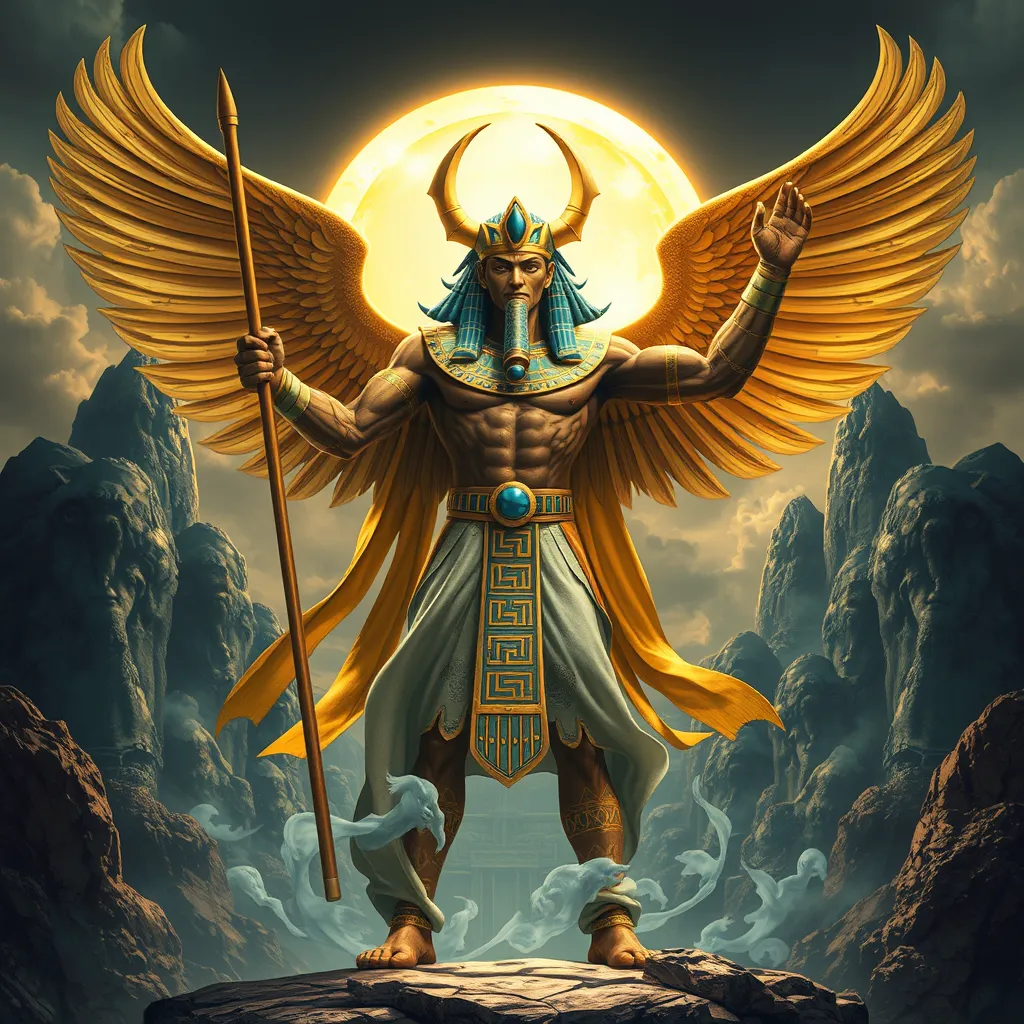The God of Strength: The Myths and Legends of Shu, the God of Air
I. Introduction
Shu, the ancient Egyptian god of air and light, holds a significant place in Egyptian mythology. He embodies the elemental forces of air and strength, serving as a crucial figure in the cosmological narratives of ancient Egypt. As a primordial deity, Shu’s presence is intertwined with the creation myths that define the ancient Egyptian worldview. This article aims to explore the myths and legends surrounding Shu, shedding light on his attributes, significance, and lasting legacy.
II. The Origins of Shu
In Egyptian cosmology, creation stories often revolve around the emergence of the gods from the chaotic waters of Nun. Shu is one of the first deities to emerge, representing the air that fills the void. He is a member of the Ennead, a group of nine deities worshipped in Heliopolis. The origins of Shu can be traced back to several creation myths:
- Creation from Nun: Shu, alongside his siblings, emerged from the primordial waters of Nun, signifying the beginning of order from chaos.
- The Separation of the Sky and Earth: Shu played a vital role in separating Nut (the sky) and Geb (the earth), allowing life to flourish.
Shu’s relationship with other primordial deities is also noteworthy. He is often depicted as the son of Atum, the creator god, and is the father of Tefnut, the goddess of moisture. This familial connection emphasizes Shu’s importance in the pantheon of Egyptian gods.
III. Shu’s Attributes and Symbols
Shu’s representation in ancient art and hieroglyphics reflects his attributes and the significance of air in the Egyptian belief system. Iconographically, Shu is often depicted as a man with a feather on his head, symbolizing air and lightness. His presence is also signified through various symbols:
- Feather: Represents air, light, and truth.
- Sun Disc: Often associated with his role in the daily journey of the sun across the sky.
- Lotus Flower: Symbolizes creation and rebirth, linked to the emergence of deities from the waters of Nun.
Shu embodies the concept of balance in the universe, maintaining the delicate equilibrium between chaos and order. His dominion over air signifies the life-giving force that sustains existence, while his strength symbolizes the power to uphold cosmic order.
IV. Myths and Legends of Shu
One of the most notable myths involving Shu is the story of his separation of Nut and Geb. This myth highlights his essential role in maintaining cosmic order:
- The Separation of Nut and Geb: Following their union, Shu intervened to separate the two, lifting Nut high above and allowing the earth to exist below. This act created space for life to thrive.
- Guardian of the Atmosphere: Shu’s role extended to safeguarding the atmosphere, preventing chaos from re-entering the ordered world.
Shu’s interventions in these myths underline his importance in the Egyptian cosmological framework, where he acts as a stabilizing force against the encroachment of chaos. Other legends also depict him as a protector of the gods, often intervening in conflicts to restore balance.
V. Shu in Ancient Egyptian Worship
Shu was venerated in various temples and places of worship throughout ancient Egypt. His primary cult center was in Heliopolis, where rituals dedicated to him were performed. Key aspects of Shu’s worship included:
- Temples: Dedicated structures where priests conducted ceremonies in honor of Shu, often associated with the sun and air.
- Rituals: Ceremonies that involved offerings to Shu, seeking his favor for good weather and bountiful harvests.
- Cultural Impact: Shu influenced daily life through agricultural practices, as the winds and air conditions affected farming cycles.
The reverence for Shu extended beyond the temples, shaping various aspects of Egyptian culture, including art, literature, and societal values.
VI. The Legacy of Shu in Later Cultures
The influence of Shu extended beyond ancient Egypt, impacting Greco-Roman interpretations of Egyptian mythology. As Hellenistic culture absorbed Egyptian beliefs, Shu’s attributes were often associated with other gods of air and strength:
- Greco-Roman Interpretations: Shu was sometimes equated with gods such as Hermes and Aeolus, who also represented aspects of air and communication.
- Modern Literature and Media: Shu’s mythos has found its way into contemporary storytelling, often depicted in novels, films, and series exploring ancient mythology.
- Comparative Mythology: Shu’s characteristics can be compared to other deities representing air and strength across cultures, such as the Greek god Zeus and the Hindu god Vayu.
These comparisons highlight the universal themes associated with air and strength, demonstrating Shu’s enduring relevance in cultural narratives.
VII. Theological Interpretations of Shu
Shu’s attributes invite various theological interpretations, especially regarding the balance of elements and the journey of the soul:
- Philosophical Implications: Shu symbolizes the idea of balance and duality, representing the harmony needed for life to exist.
- Role in the Afterlife: In Egyptian beliefs, Shu was seen as a guide for souls navigating the afterlife, ensuring they found their way through the cosmic realms.
- Modern Spirituality: Contemporary interpretations of Shu often emphasize the importance of air and breath in spiritual practices, linking him to concepts of mindfulness and presence.
These discussions underscore Shu’s relevance in both ancient and modern contexts, as his attributes resonate with fundamental human experiences.
VIII. Conclusion
Shu, the god of air and strength, occupies a pivotal role in Egyptian mythology and culture. His significance lies not only in his actions as a primordial deity but also in the enduring legacy of his stories and attributes. As we explore the myths and legends surrounding Shu, we gain insight into the ancient Egyptian worldview, where strength and air symbolize life, balance, and order. Preserving these myths and understanding their implications enriches our comprehension of ancient cultures and their beliefs, reminding us of the power of mythology in shaping human experience.




